June 2nd, 2015
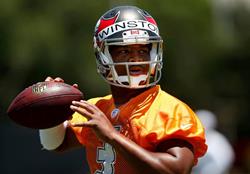
A CBS Sports columnist thinks “America’s Quarterback” will do what no NFL QB has done in nearly three decades, and it ain’t good.
Joe has heard, seen and read wild stuff spoken and written about “America’s Quarterback,” Jameis Winston, since he last took the field for Florida State.
The best/worst was when NFL Network draft guru Mike Mayock said Winston should have thrown 40 picks last season. [read more]
Posted in Recent Posts | 50 Comments »
June 1st, 2015
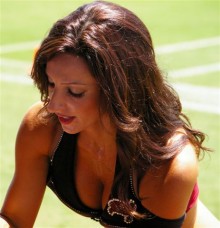 Through the magic of YouTube, Joe can transport you into training camp in a way Hard Knocks never could. [read more]
Through the magic of YouTube, Joe can transport you into training camp in a way Hard Knocks never could. [read more]
Posted in Recent Posts | 13 Comments »
June 1st, 2015
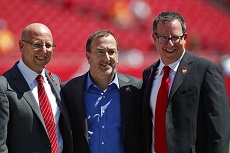 Former college quarterback turned NFL scout turned NFL Network draft guru Daniel Jeremiah slammed the Bucs last week. National uber insider Peter King buried them today.
Former college quarterback turned NFL scout turned NFL Network draft guru Daniel Jeremiah slammed the Bucs last week. National uber insider Peter King buried them today.
And a local beat writer offered painful talk to Bucs fans on Saturday. [read more]
Posted in Recent Posts | 63 Comments »
June 1st, 2015

Yes, you’ve read and heard and watched folks break down the draft of the Bucs, not a month after the fact.
Joe is of the mind that it takes three years to dish out objective grades. [read more]
Posted in Recent Posts | 24 Comments »
June 1st, 2015
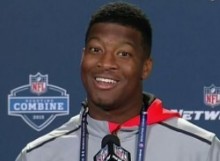
“America’s Quarterback” has a life outside of football.
Joe just cannot believe how nuts some Bucs fans are. They whine all the time how the likes of BSPN won’t give the Bucs any attention — frankly, teams that finish 2-14 should get zero national attention other than to be mocked on a daily basis — and once the team gets a superstar and a national celebrity, all of a sudden it is horrible and the guy should be locked in Lovie’s Chicago basement until training camp. [read more]
Posted in Recent Posts | 75 Comments »
June 1st, 2015
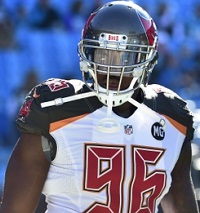
General manager Jason Licht explains.
Joe’s proclaimed several times that one reason the Buccaneers will have a better pass rush this season is the mere absence of ghostly Michael Johnson. [read more]
Posted in Recent Posts | 11 Comments »
June 1st, 2015
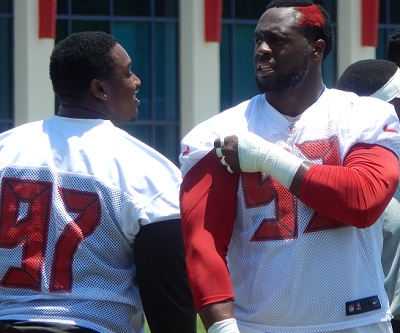
Those who follow Gerald McCoy on social media and regularly read JoeBucsFan.com know that No. 93 has had a bitter edge to him this year.
It’s like he’s turned into the “angry worker” Raheem Morris asked all his players to become. [read more]
Posted in Recent Posts | 29 Comments »
June 1st, 2015
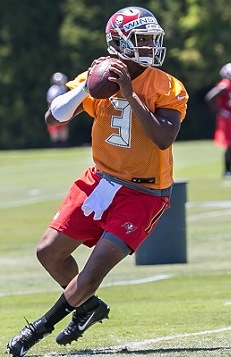
Another national voice buries the Bucs in the basement
Joe will never forget the night the Bucs drafted “America’s Quarterback,” signal-caller Jameis Winston. In a conference call with the Tampa Bay pen and mic club as Jameis was in his Alabama hometown, Jameis rejoiced over having Mike Evans and Vincent Jackson, both 6-5, as his new targets.
“TWO OF THEM!” Jameis bellowed with glee. [read more]
Posted in Recent Posts | 31 Comments »
June 1st, 2015
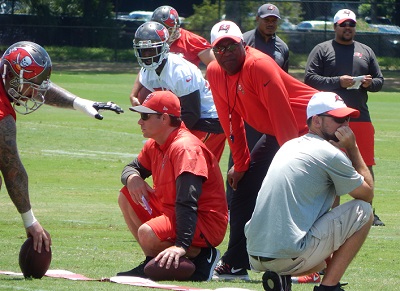
What appeared to be a typical scene at a Bucs OTA practice on Thursday felt like something more. [read more]
Posted in Recent Posts | 20 Comments »
June 1st, 2015
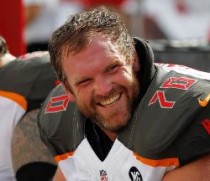
Details emerge from One Buc Palace
OK, Joe is going to share a neat little story with a cool twist. But you have to follow along. It gets better as you read.
Now there has been a lot of talk that barbecue pitmaster, Bucs left guard Logan Mankins, is rejuvenated. Yeah, yeah, yeah, after the way he and his offensive line mates played, Joe is more than a little dubious about Mankins – or any other holdover from last year’s debacle of a line – and a rekindled love for the game. [read more]
Posted in FHR, Recent Posts | 54 Comments »
June 1st, 2015
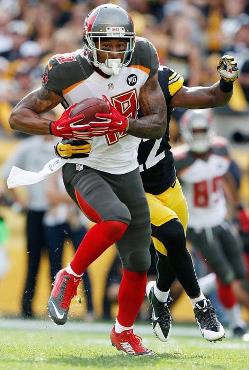
Louis Murphy spoke about “America’s Quarterback” and how he has rediscovered his love of football with the Bucs.
Yes, Joe knows you have heard Bucs types, whether it be Jason Licht or Lovie Smith, rave about “America’s Quarterback,” signal-caller Jameis Winston.
Well, now it’s time for Jameis’ teammates to speak out. And they are.
Add receiver Louis Murphy to the list of those singing hosannas about Jameis. [read more]
Posted in Recent Posts | 9 Comments »
May 31st, 2015
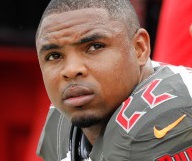 Lovie Smith said Doug Martin was a first team running back last week, but then Lovie backed off that moments later and said there was no depth chart, during a chat with media about second-year RB Charles Sims. [read more]
Lovie Smith said Doug Martin was a first team running back last week, but then Lovie backed off that moments later and said there was no depth chart, during a chat with media about second-year RB Charles Sims. [read more]
Posted in Recent Posts | 50 Comments »
May 31st, 2015

A Bucs team insider explains
Yes, the offensive line was so bad last year, a Bucs fan could have yacked on his living room carpet and his wife wouldn’t have blown a gasket because she likely was in the bathroom with a finger down her throat, too. [read more]
Posted in Recent Posts | 24 Comments »
May 31st, 2015
 Not every Buccaneers beat writer thinks it’s a slam dunk that America’s Quarterback, Jameis Winston, is the Tampa Bay starting QB when the snaps really matter. [read more]
Not every Buccaneers beat writer thinks it’s a slam dunk that America’s Quarterback, Jameis Winston, is the Tampa Bay starting QB when the snaps really matter. [read more]
Posted in Recent Posts | 45 Comments »
May 31st, 2015
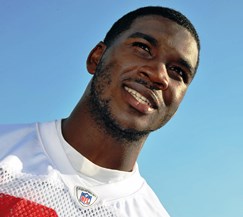
With the exception of Doug Martin’s rookie season, the Bucs haven’t had a decent run game since LeGarrette Blount and Cadillac Williams combined for 1,444 yards in 2010 (and for you Blountheads, please stop whining about him being traded to the Fighting Belicheats. The guy has been let go by two teams since that trade. The dude isn’t Jim Brown). [read more]
Posted in Recent Posts | 27 Comments »
May 30th, 2015
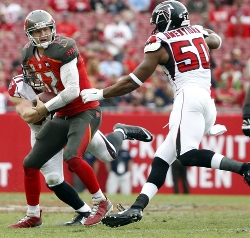
Joe is sure there are other Bucs fans like this: there are dents on the wall behind Joe’s 60-inch HDTV from throwing the remote because last year’s gutless offensive line couldn’t block its own shadow. [read more]
Posted in Recent Posts | 31 Comments »
May 30th, 2015
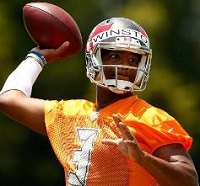
Photo courtesy of Buccaneers.com.
Yes, the Bucs held OTAs for three days at One Buc Palace. Only one of those practices was open for the gazing eyes of the Tampa Bay pen and mic club.
That doesn’t mean no one was watching. [read more]
Posted in Recent Posts | 18 Comments »
May 30th, 2015
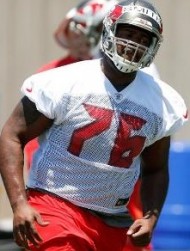
All that show and tell this week about Kevin Pamphile being the Buccaneers’ No. 1 left tackle may not be what it appears. [read more]
Posted in Recent Posts | 23 Comments »

























